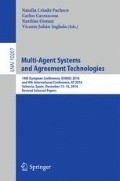Abstract
Ag-MAS community created autonomous and proactive intelligent entities (which will become ‘presences’ and ‘roles’ in our hybrid (human and artificial agents) society and mixed reality (combined virtual and ‘real’ world). Now a question will be: are we able to manage these autonomous and too informed and intelligent agents?
Access this chapter
Tax calculation will be finalised at checkout
Purchases are for personal use only
Notes
- 1.
“Proactive” means that the Ag can anticipate us, takes the initiative; has its own information, and understanding, and learning, and abilities, …; “Goal-Adoption” is not “execution”, “obedience”; and there are different levels of delegation, reliance, adjustability, etc. And there is a “spontaneous” (not requested!) help, and help beyond request and even violating request, but “for our good”, with a “tutelary” role.
- 2.
The famous poem of Bertolt Brecht: “General, your tank is a powerful vehicle/ It smashes down forests and crushes a hundred men./ But it has one defect:/ It needs a driver./ General, your bomber is powerful./ It flies faster than a storm and carries more than an elephant./ But it has one defect:/ It needs a mechanic./ General, man is very useful./ He can fly and he can kill./ But he has one defect:/ He can think.”
- 3.
Our notion of “manipulation” is: X influences Y’s behavior by communication or action, by changing Y’s goals, by changing his/her beliefs and feelings, but in a hidden way. That is, without communicating his intention of influencing Y, of changing Y’s mind.
- 4.
“Immergence” theory (Conte and Castelfranchi, Cognitive and Social Action, UCL Press, 1995); Castelfranchi, C. (2001). The theory of social functions. Challenges for multi-agent-based social simulation and multi-agent learning. Journal of Cognitive Systems Research 2, 5–38. Elsevier. http://www.cogsci.rpi.edu/~rsun/si-mal/article1.pdf.
- 5.
Alessandro Ricci, Michele Piunti, Luca Tummolini and Cristiano Castelfranchi, The Mirror World: Preparing for Mixed-Reality Living. PERVASIVE COMPUTING, 1536-1268/15/2015 IEEE.
- 6.
See for example the remarkable results of the Project on “Agreement Technologies”:
- 7.
Castelfranchi, C. (2014) Making Visible “the Invisible Hand”. The Mission of Social Simulation. In Adamatti, D.F., Pereira Dimuro, G., Coelho, H. (eds.) Interdisciplinary Applications of Agent-Based Social Simulation and Modeling. IGI Global, 2014.
Acknowledgments
This contribution is in memory of Rosaria Conte (Social Simulation LABSS Group). I like to thank my research group in Cognitive Science at ISTC: the ‘GOAL group’ http://www.istc.cnr.it/group/goal.
I’m also in debt with our community of Ag and MAS, in particular with EUMAS, and with the scholars of the Agreement Technologies project.
Author information
Authors and Affiliations
Corresponding author
Editor information
Editors and Affiliations
Rights and permissions
Copyright information
© 2017 Springer International Publishing AG
About this paper
Cite this paper
Castelfranchi, C. (2017). Autonomy and Roles of Intelligent Social Agents in Our Hybrid and Mixed World: Some Hints. In: Criado Pacheco, N., Carrascosa, C., Osman, N., Julián Inglada, V. (eds) Multi-Agent Systems and Agreement Technologies. EUMAS AT 2016 2016. Lecture Notes in Computer Science(), vol 10207. Springer, Cham. https://doi.org/10.1007/978-3-319-59294-7_1
Download citation
DOI: https://doi.org/10.1007/978-3-319-59294-7_1
Published:
Publisher Name: Springer, Cham
Print ISBN: 978-3-319-59293-0
Online ISBN: 978-3-319-59294-7
eBook Packages: Computer ScienceComputer Science (R0)

